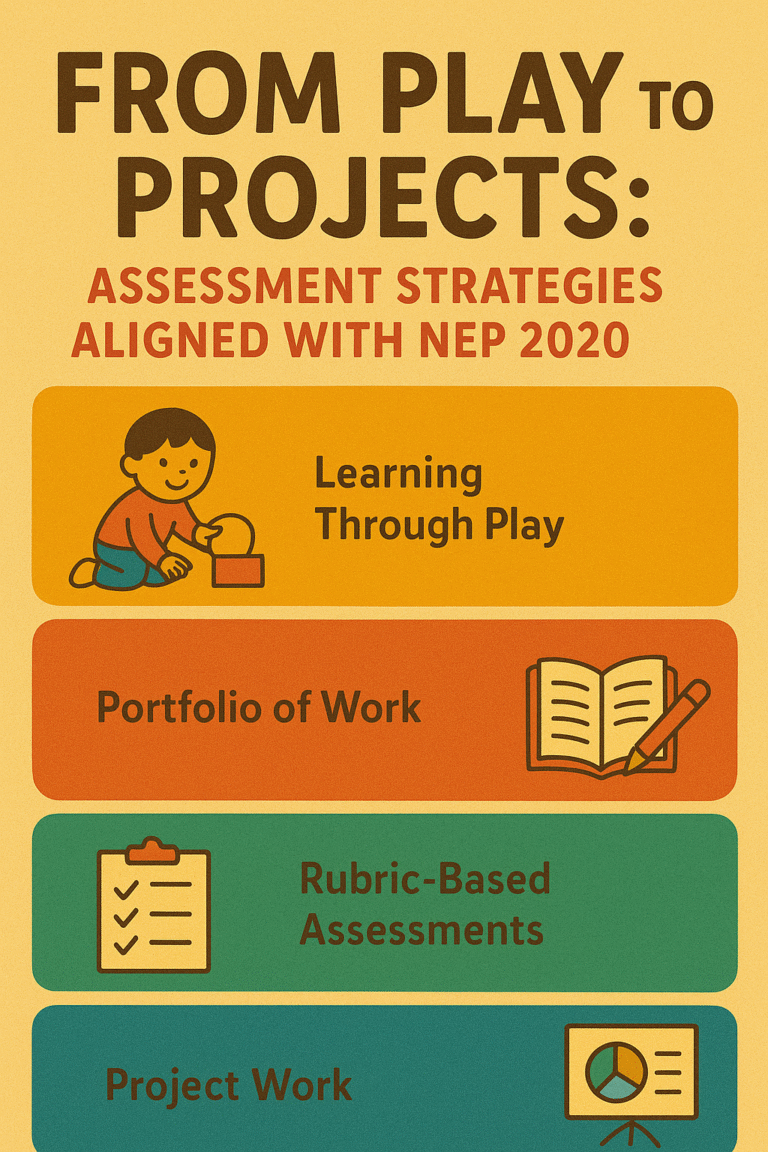
Assessment Ideas According to NEP 2020 in the 5+3+3+4
https://www.acadecraft.com/blog/5-3-3-4-education-system-nep-2020/
The National Education Policy (NEP) 2020 emphasizes moving away from rote learning to competency-based assessment. It encourages teachers to evaluate not only what children know but also what they can do, how they think, and how they apply knowledge in real life. Assessments should be holistic, continuous, and focused on development to support each child’s growth.
The policy divides school education into four stages according to the 5+3+3+4 curricular structure. Below are some innovative assessment ideas for each stage.
1. Foundational Stage (5 years: 3 years of preschool, Grades 1-2)
Focus: Play-based, activity-based, discovery-based learning.
Assessment Ideas:
Anecdotal Records: Teachers can keep short notes on children’s participation, curiosity, and interaction.
Portfolio of Work: Collect drawings, storytelling recordings, crafts, and early literacy or numeracy tasks.
Learning Through Play: Assess through puzzles, role-play, rhymes, and hands-on activities.
Observation Checklists: Track progress in motor skills, language, and social-emotional development.
Parent-Teacher Interactions: Share simple progress reports that highlight strengths and areas for support.
2. Preparatory Stage (3 years: Grades 3-5)
Focus: Building literacy, numeracy, and curiosity through activity-based and interactive learning.
Assessment Ideas:
Project Work: Group projects on the environment, stories, or community life.
Rubric-Based Assessments: For presentations, experiments, and art integration activities.
Learning Journals: Students keep diaries to express their reflections and experiences.
Peer Assessment: Encourage children to give feedback on each other’s group activities.
Formative Quizzes: Short, fun, game-based quizzes instead of traditional tests.
3. Middle Stage (3 years: Grades 6-8)
Focus: Understanding concepts, thinking critically, and exploring sciences, arts, and vocational subjects.
Assessment Ideas:
Subject Portfolios: Keep notebooks with concept maps, creative writing, and problem-solving exercises.
Competency-Based Assessments: Instead of memorization, emphasize application (e.g., “How can you cut down on plastic use at home?”).
Debates & Discussions: Evaluate communication, reasoning, and teamwork skills.
Self & Peer Evaluation: Use reflective sheets where students review their own work.
Digital Tools: Use apps or online platforms for quiz-based learning.
4. Secondary Stage (4 years: Grades 9-12)
Focus: Critical thinking, career readiness, flexibility of subjects, and depth of knowledge.
Assessment Ideas:
Research Projects: Encourage independent or group research with presentations.
Case Studies: Students analyze real-world problems, such as sustainable farming and climate change.
Internships/Field Work Reports: Practical exposure assessed through reflective journals.
Portfolio + Viva: A collection of academic work, extracurriculars, and reflections with an oral assessment.
Board Exams (Redesigned): More focus on application, problem-solving, and multiple-choice questions instead of memorization.
https://www.education.gov.in/shikshakparv/docs/Examination_and_Assessment_Reforms.pdf
Conclusion
NEP 2020 sees assessment as a tool for learning, not for judgment. By including observations, projects, portfolios, reflections, and peer feedback, assessments can become meaningful and enjoyable for learners at every stage.
When teachers apply these new assessment ideas within the 5+3+3+4 framework, education gets closer to the true spirit of NEP 2020, which is holistic, skill-focused, and centered on learners.
